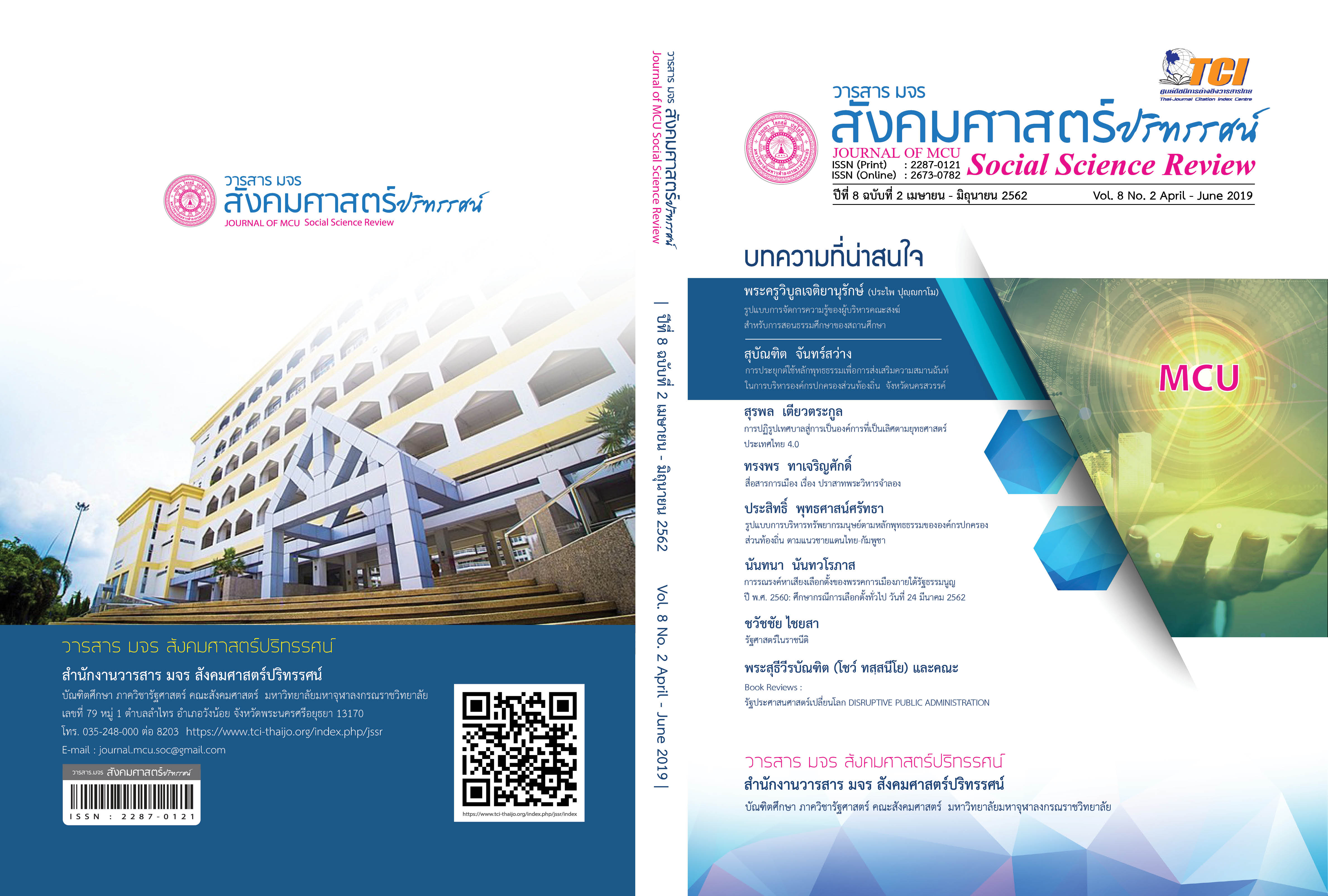การประยุกต์ใช้หลักพุทธธรรมเพื่อการส่งเสริมความสมานฉันท์ในการบริหารองค์กรปกครองส่วนท้องถิ่น จังหวัดนครสวรรค์
คำสำคัญ:
An Application of Buddhist, Reconciliation, Local Administrative Organizationsบทคัดย่อ
บทความนี้ มีวัตถุประสงค์ คือ 1. เพื่อศึกษาการส่งเสริมความสมานฉันท์ในการบริหารองค์กรปกครองส่วนท้องถิ่นจังหวัดนครสวรรค์ 2. เพื่อศึกษาความสัมพันธ์ระหว่างปัจจัยการบริหารและหลักพุทธธรรมกับการส่งเสริมความสมานฉันท์ในการบริหารองค์กรปกครองส่วนท้องถิ่นจังหวัดนครสวรรค์ และ 3. เพื่อนำเสนอรูปแบบการประยุกต์ใช้หลักพุทธธรรมเพื่อการส่งเสริมความสมานฉันท์ในการบริหารองค์กรปกครองส่วนท้องถิ่น จังหวัดนครสวรรค์
การวิจัยเป็นแบบผสานวิธี ระหว่างการวิจัยเชิงปริมาณ และวิจัยเชิงคุณภาพ เครื่องมือวิจัยเชิงปริมาณ ใช้แบบสอบถามซึ่งมีค่าความเชื่อมั่นทั้งฉบับเท่ากับ 0.992 ในการเก็บข้อมูลซึ่งผู้วิจัยได้เก็บข้อมูลด้วยตนเองกับกลุ่มตัวอย่างคือ บุคลากรองค์การบริหารส่วนจังหวัด เทศบาล องค์การบริหารส่วนตำบล มีจำนวนทั้งหมด 10,543 คน โดยมีการสุ่มตัวอย่างตามวิธีการของทาโร่ยามาเน่ (Taro Yamane) จำนวน 385 รูปหรือคน ซึ่งได้มาจากการสุ่มตัวอย่างแบบชั้นภูมิวิเคราะห์ข้อมูลโดยใช้โปรแกรมสำเร็จรูปทางสถิติ คือค่าความถี่ ค่าร้อยละ ค่าเฉลี่ย ส่วนเบี่ยงเบนมาตรฐาน และการทดสอบสัมประสิทธิ์สหสัมพันธ์แบบเพียร์สัน ในส่วนของการวิจัยเชิงคุณภาพใช้เครื่องมือคือแบบสัมภาษณ์เชิงลึกโดยสัมภาษณ์ผู้ให้ข้อมูลสำคัญจำนวน 18 รูปหรือคน และการสนทนากลุ่มเฉพาะผู้ทรงคุณวุฒิจำนวน 10 รูปหรือคน โดยใช้เทคนิคการวิเคราะห์เนื้อหาเชิงพรรณนา
ผลการวิจัยพบว่า
- 1. การส่งเสริมความสมานฉันท์ในการบริหารองค์กรปกครองส่วนท้องถิ่น จังหวัดนครสวรรค์ มี 3 ด้าน คือ 1) การบริหารแบบมีส่วนร่วมและย่อมรับร่วมกัน ต้องบังคับใช้กฎหมาย ที่เท่าเทียมกัน 2) การบริหารโดยบังคับใช้กฎหมายที่เท่าเทียมกัน ต้องปฏิบัติต่อทุกคนภายใต้กฎหมายที่เท่าเทียมกัน 3) การรณรงค์สร้างความรักความสามัคคีเห็นแก่ประโยชน์ส่วนรวม มีการจัดโครงการและกิจกรรม เพื่อส่งเสริมคุณธรรมจริยธรรมภายในองค์กร
- ปัจจัยที่มีความสัมพันธ์ระหว่างปัจจัยการบริหารและหลักพุทธธรรมกับการส่งเสริมความสมานฉันท์ในการบริหารองค์กรปกครองส่วนท้องถิ่นจังหวัดนครสวรรค์ พบว่าปัจจัยด้านการบริหารมีความสัมพันธ์กับการส่งเสริมความสมานฉันท์ในการบริหารองค์กรปกครองส่วนท้องถิ่นจังหวัดนครสวรรค์ มีค่าความสัมพันธ์เชิงบวกค่อนข้างสูง (r= 0.780) อย่างมีนัยสำคัญทางสถิติที่ระดับ 0.01 ปัจจัยด้านหลักสาราณียธรรม 6 กับการส่งเสริมความสมานฉันท์ในการบริหารองค์กรปกครองส่วนท้องถิ่นจังหวัดนครสวรรค์ มีความสัมพันธ์เชิงบวกสูงมาก (r=0.874) อย่างมีนัยสำคัญทางสถิติที่ระดับ 0.01 และปัจจัยด้านหลักอปริหานิยธรรม 7 กับการส่งเสริมความสมานฉันท์ในการบริหารองค์กรปกครองส่วนท้องถิ่นจังหวัดนครสวรรค์มีความสัมพันธ์เชิงบวกสูงมาก (r=0.809) อย่างมีนัยสำคัญทางสถิติที่ระดับ 0.01 จึงยอมรับสมมติฐานการวิจัย
- รูปแบบการประยุกต์ใช้หลักพุทธธรรมเพื่อการส่งเสริมความสมานฉันท์ในการบริหารองค์กรปกครองส่วนท้องถิ่นจังหวัดนครสวรรค์ประกอบด้วย 3 ด้าน คือ 1) ด้านการบริหารแบบมี ส่วนร่วมและยอมรับร่วมกันแนวทางในการส่งเสริม ได้แก่ การบังคับใช้กฎหมายที่เท่าเทียมกัน การบริหารแบบมีส่วนร่วมและการยอมรับร่วมกันโดยการประชุมปรึกษาหารือเป็นประจำทุกเดือน เปิดพื้นที่หรือเวทีทางความคิดให้เกิดการยอมรับและสร้างแนวทางส่งเสริมความสมานฉันท์ในองค์การ และไม่ใช้ความคิดเห็นตนเองเป็นใหญ่ คำนึงถึงหลักคุณธรรม จริยธรรมและศีลธรรมในการช่วยกันตัดสินใจ 2) ด้านการบริหารโดยบังคับใช้กฎหมายที่เท่าเทียมกัน แนวทางในการส่งเสริมได้แก่ การส่งเสริมให้เกิดการเรียนรู้ของชุมชนโดยใช้กฎหมายโดยเท่าเทียมกัน การสนับสนุนให้ชุมชนเข้ามีส่วนร่วมในการดำเนินการแก้ปัญหาร่วมกัน โดยการถ่ายโอนภารกิจให้กับชุมชน และการส่งเสริมสนับสนุนวัฒนธรรมจารีตประเพณีคำนึงถึงหลักคุณธรรม จริยธรรมและศีลธรรมในการช่วยกันตัดสินใจ 3) ด้านการรณรงค์สร้างความรักความสามัคคีเห็นแก่ประโยชน์ส่วนรวม แนวทางในการส่งเสริมได้แก่ บทบาทในการส่งเสริมให้เกิดความยั่งยืน (รณรงค์สร้างความรักความสามัคคีเห็นแก่ประโยชน์ชาติ) ให้ความสำคัญกับการสร้างเครือข่าย ภาคีความร่วมมือ และส่งเสริมให้ชุมชนสามารถจัดการตนเอง โดยคนในชุมชน ประกอบด้วย การสร้างเครือข่ายภาคีความร่วมมือ ผ่านกลไกการประชุมประชาคม การส่งเสริมการจัดการตนเองของคนในชุมชน ส่งเสริมกระบวนการทำงานร่วมกันของชุมชนและการให้ความรู้ในการจัดการชุมชน กับคนในชุมชนให้สามารถดำเนินการและบริหารจัดการความขัดแย้งภายในชุมชนโดยคน ในชุมชนเอง ที่ส่งผลต่อการกำหนดกิจกรรมและวิธีการแก้ปัญหาได้อย่างตรงตามความต้องการของคนในชุมชนคำนึงถึงหลักคุณธรรม จริยธรรมและศีลธรรมในการช่วยกันตัดสินใจ
คำสำคัญ : การประยุกต์ใช้หลักพุทธธรรม, ความสมานฉันท์, การบริหารองค์กรปกครองส่วนท้องถิ่น
ส่วนท้องถิ่
เอกสารอ้างอิง
Kovit Puangngam. (2016). Thai Local Government. Bangkok: Wiyyoochon.
Ratthaphon Yenjaima. (2018). Conflict in Society : Theory and Solution. Journal of MCU Social Science Review, 7 (2), 224-238.
School of Management Science. (2014). Local Administration. Nontaburi : Sukhothai Thammathirat University.
Sirirat Klangyen. (2014). An Administration to Excellence Practice In Accordance
With Buddhist Good Governance of Local Administrative Organization. (Doctoral of Thesis). Graduate School : Mahachulalongkornrajavidyalaya University.
Sutthaya Aobaom. (2014). The Personel’s Competency Development for Staff of
Local Administrative Organization According to Buddhism (Doctoral of
Thesis). Graduate School : Mahachulalongkornrajavidyalaya University.
Surinthon Sithonkul. (2013). Good Governance Leader of Local Administrative
Organization Lower Northeastern Region. (Doctoral of Thesis). Graduate School : Mahachulalongkornrajavidyalaya University.
Thitiwut Manmee. (2013). The Employees Commitment to Local Administrative
Organizations (Doctoral of Thesis). Graduate School : Mahachulalongkorn-
rajavidyalaya University.
Voraphas Prasomsul. (2007). The Principles of Educational Administration Based Upon Buddha-Dhamma (Doctoral of Thesis). Graduate School : Naresuan University.
ดาวน์โหลด
เผยแพร่แล้ว
รูปแบบการอ้างอิง
ฉบับ
ประเภทบทความ
สัญญาอนุญาต
ลิขสิทธิ์ (c) 2019 วารสาร มจร สังคมศาสตร์ปริทรรศน์

อนุญาตภายใต้เงื่อนไข Creative Commons Attribution-NonCommercial-NoDerivatives 4.0 International License.
เพื่อให้เป็นไปตามกฎหมายลิขสิทธิ์ ผู้นิพนธ์ทุกท่านต้องลงลายมือชื่อในแบบฟอร์มใบมอบลิขสิทธิ์บทความให้แก่วารสารฯ พร้อมกับบทความต้นฉบับที่ได้แก้ไขครั้งสุดท้าย นอกจากนี้ ผู้นิพนธ์ทุกท่านต้องยืนยันว่าบทความต้นฉบับที่ส่งมาตีพิมพ์นั้น ได้ส่งมาตีพิมพ์เฉพาะในวารสาร มจร สังคมศาสตร์ปริทรรศน์ เพียงแห่งเดียวเท่านั้น หากมีการใช้ภาพหรือตารางหรือเนื้อหาอื่นๆ ของผู้นิพนธ์อื่นที่ปรากฏในสิ่งตีพิมพ์อื่นมาแล้ว ผู้นิพนธ์ต้องขออนุญาตเจ้าของลิขสิทธิ์ก่อน พร้อมทั้งแสดงหนังสือที่ได้รับการยินยอมต่อบรรณาธิการ ก่อนที่บทความจะได้รับการตีพิมพ์ หากไม่เป็นไปตามข้อกำหนดเบื้องต้น ทางวารสารจะถอดบทความของท่านออกโดยไม่มีข้อยกเว้นใดๆ ทั้งสิ้น





